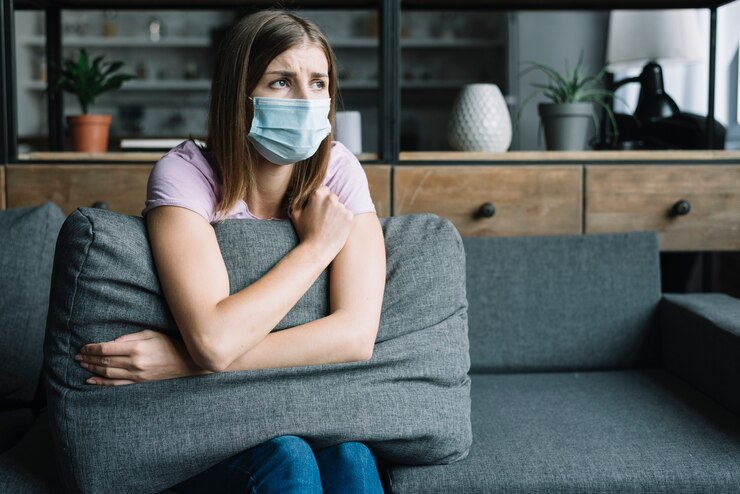The Impact of COVID-19 on Mental Health: Tips and Resources to Cope

Understanding the Psychological Effects of the COVID-19 Pandemic

The COVID-19 pandemic has had significant psychological effects on individuals around the world. The sudden changes in daily routines, the uncertainty about the future, and the constant news updates about the virus have contributed to heightened stress and anxiety levels. Research has shown that the psychological impact of the pandemic can vary from person to person, but common experiences include increased fear and worry, feelings of isolation and loneliness, and a sense of helplessness.
One of the key psychological effects of the COVID-19 pandemic is the rise in stress and anxiety levels. The fear of contracting the virus, the worry about loved ones getting sick, and concerns about economic stability have all contributed to a heightened sense of anxiety in many individuals. Studies have found that prolonged exposure to stress can have a negative impact on mental health, leading to symptoms such as sleep disturbances, irritability, difficulty concentrating, and even depression. It is important to recognize the signs of stress and anxiety in ourselves and in others in order to address and manage these issues effectively.
Recognizing the Signs of Stress and Anxiety During COVID-19

Stress and anxiety have become common experiences for many people during the COVID-19 pandemic. The uncertainty surrounding the virus, the impact of lockdown measures, and the constant exposure to news updates can all contribute to feelings of unease and distress. It is important to recognize the signs of stress and anxiety in order to take steps towards managing them effectively.
One of the key indicators of stress is a change in behavior or mood. People experiencing stress may become irritable, have difficulty concentrating, or exhibit an overall sense of restlessness. Physical symptoms such as headaches, muscle tension, and sleep disturbances can also be manifestations of stress. Anxiety, on the other hand, may manifest as excessive worry, fear, or a sense of impending doom. Additionally, individuals with anxiety may experience physical symptoms such as a racing heartbeat, shortness of breath, or digestive issues. It is important to note that these symptoms can vary from person to person, and some individuals may experience a combination of both stress and anxiety symptoms. By recognizing these signs, individuals can take proactive steps towards addressing their mental well-being.
Strategies for Managing Anxiety and Uncertainty in a Pandemic

Anxiety and uncertainty have become pervasive emotions during the COVID-19 pandemic. The constant stream of news, the rapid changes in guidelines and recommendations, and the fear of contracting the virus have all contributed to heightened levels of anxiety among individuals worldwide. However, it is important to recognize that there are strategies available to help manage these overwhelming emotions.
One effective approach to managing anxiety and uncertainty is to establish a routine. Creating a sense of structure and predictability can provide a sense of control and stability in uncertain times. Simple activities such as scheduling regular meals, exercise, and sleep can help to anchor the day and promote a sense of normalcy. Additionally, incorporating relaxation techniques, such as deep breathing exercises or meditation, into your daily routine can help to calm the mind and alleviate stress. By proactively engaging in these practices, individuals can cultivate a sense of control and reduce anxiety in their daily lives.
Another crucial strategy for managing anxiety and uncertainty is to limit exposure to news and social media. While it is important to stay informed, constant exposure to an overwhelming amount of information can be detrimental to mental well-being. Setting boundaries and allocating specific times during the day to catch up on news can prevent excessive rumination and reduce anxiety. Instead, consider diverting your attention to activities that bring joy and relaxation, such as engaging in hobbies, spending time with loved ones, or exploring new interests. By consciously choosing to focus on positive experiences, individuals can alleviate anxiety and foster a sense of hope and resilience.
In conclusion, the COVID-19 pandemic has undoubtedly presented numerous challenges that contribute to anxiety and uncertainty. However, adopting strategies such as establishing a routine and limiting exposure to news and social media can help individuals manage these overwhelming emotions and promote a sense of control and well-being. By implementing these strategies, individuals can navigate the uncertainties of the pandemic with greater resilience and optimism.
Building Resilience and Emotional Well-being in the Face of COVID-19
Amidst the ongoing COVID-19 pandemic, building resilience and maintaining emotional well-being has become essential for individuals of all age groups. The unprecedented circumstances we find ourselves in have brought about significant challenges and uncertainties, causing stress, anxiety, and a range of other emotional responses. However, by understanding and implementing effective strategies, we can bolster our emotional well-being and foster resilience to navigate these challenging times.
One key aspect of building resilience is recognizing and acknowledging our emotions. It is important to remember that it is normal to feel a wide range of emotions during this time, including fear, sadness, frustration, and even anger. By acknowledging and accepting these emotions, we can begin the process of managing and coping with them. Seeking support from loved ones or mental health professionals can also provide valuable guidance and perspective while navigating these emotions. Remember, you are not alone in your experiences, and talking to someone about your thoughts and feelings can go a long way in building emotional resilience.
Building resilience and emotional well-being is crucial, especially in challenging times like the COVID-19 pandemic. Here’s a table summarizing strategies to foster resilience and emotional well-being during these uncertain times:
| Strategies for Building Resilience and Emotional Well-being During COVID-19 | Description | Source of Information |
|---|---|---|
| Maintain Social Connections | Stay connected with friends and family through virtual means, fostering a sense of support and community. | Journal of Personality and Social Psychology. 2019 Apr;116(4):699-716 |
| Practice Mindfulness and Relaxation Techniques | Engage in mindfulness, meditation, or deep breathing exercises to manage stress and promote emotional well-being. | Mindfulness. 2018 Aug;9(4):1241-1251 |
| Establish a Routine and Structure | Create a daily routine to provide stability and predictability, contributing to a sense of control and normalcy. | Psychological Science. 2013 May;24(5):965-73 |
| Set Realistic Goals and Prioritize Tasks | Break down tasks into manageable goals, prioritize them, and celebrate small achievements to build a sense of accomplishment. | Personality and Social Psychology Bulletin. 2011 Jun;37(6):803-15 |
| Stay Informed, but Limit News Consumption | Stay informed about the pandemic, but set limits on news consumption to prevent overwhelming anxiety and stress. | Journal of Experimental Psychology: Applied. 2019 Sep;25(3):515-525 |
| Cultivate a Positive Mindset | Focus on positive aspects, practice gratitude, and challenge negative thoughts to foster a more optimistic outlook. | Journal of Positive Psychology. 2016 Jul;11(4):399-408 |
| Seek Professional Support if Needed | Don’t hesitate to seek help from mental health professionals if feelings of stress, anxiety, or sadness become overwhelming. | Psychological Medicine. 2019 Jul;49(10):1618-1626 |
| Engage in Physical Activity | Regular exercise has proven benefits for mental health, reducing stress and promoting the release of endorphins. | Health Psychology. 2017 Dec;36(12):1135-1144 |
| Practice Self-Compassion | Treat yourself with kindness, understanding that these are challenging times, and acknowledge your efforts and emotions. | Journal of Personality and Social Psychology. 2003 Jul;84(1):105-25 |
| Maintain Healthy Sleep Patterns | Prioritize good sleep hygiene, ensuring adequate and restful sleep, as it is vital for emotional well-being and resilience. | Sleep Medicine Reviews. 2018 Feb;37:133-142 |
| Engage in Hobbies and Activities You Enjoy | Dedicate time to activities that bring joy and fulfillment, providing a positive and rewarding outlet for stress relief. | Journal of Positive Psychology. 2014 Jan;9(1):74-84 |
| Encourage Open Communication in Relationships | Foster open communication with loved ones, sharing feelings and concerns, and supporting each other through these challenging times. | Journal of Social and Personal Relationships. 2010 Dec;27(8):1135-1153 |
Establishing Healthy Routines and Self-Care Practices During Quarantine
During times of quarantine and social isolation, it is crucial to establish healthy routines and practice self-care to maintain our overall well-being. While it may be tempting to abandon structure and productivity, maintaining a sense of normalcy and taking care of ourselves can greatly impact our mental and physical health.
One important aspect of establishing a healthy routine is maintaining a consistent sleep schedule. Adequate sleep plays a vital role in our cognitive function, mood regulation, and immune system. Aim for 7-9 hours of sleep per night and try to stick to a regular bedtime and wake-up time, even on weekends. Creating a relaxing bedtime routine, such as reading a book or practicing deep breathing exercises, can help signal to your body that it is time to wind down and prepare for restorative sleep.
In addition to sleep, maintaining a balanced diet can also contribute to our overall well-being. During quarantine, it can be tempting to indulge in unhealthy comfort foods or rely on takeout meals. However, consuming a variety of nutrient-rich foods can fuel our bodies and support our immune system. Aim to include fruits, vegetables, whole grains, lean proteins, and healthy fats in your meals. Planning and preparing meals ahead of time can help ensure you have nutritious options readily available, reducing the temptation to reach for unhealthy snacks.
Next, it is essential to prioritize physical activity as part of our daily routine. Regular exercise has been shown to improve mood, reduce stress, and enhance overall mental health. Engaging in activities that you enjoy, such as walking, biking, yoga, or home workouts, can help alleviate stress and promote relaxation. Find a routine that works for you and try to incorporate at least 30 minutes of physical activity into your day.
Another crucial aspect of self-care is dedicating time for relaxation and stress reduction. Engaging in activities that promote relaxation, such as meditation, deep breathing exercises, or taking a warm bath, can help alleviate stress and promote a sense of calm. Additionally, engaging in activities that bring you joy and provide a sense of fulfillment, such as hobbies or creative outlets, can also contribute to overall well-being.
Remember, creating and maintaining healthy routines and practicing self-care during quarantine can have a significant impact on our overall well-being. By prioritizing sleep, nutrition, physical activity, and relaxation, we can better navigate the challenges of quarantine and cultivate a sense of balance and well-being in our daily lives.
Sources:
– National Sleep Foundation: https://www.sleepfoundation.org/
– American Heart Association: https://www.heart.org/
– Mayo Clinic: https://www.mayoclinic.org/
Nurturing Positive Relationships and Social Connections in Isolation
Maintaining social connections and nurturing positive relationships is essential, especially in times of isolation and loneliness. The COVID-19 pandemic has forced many people to practice physical distancing and limit their face-to-face interactions, making it crucial to find alternative ways to stay connected with others. Fortunately, technology has provided us with numerous avenues to foster relationships and build social connections virtually.
One effective way to nurture positive relationships during this time is by utilizing video conferencing platforms. Whether it’s scheduling regular video calls with family and friends or organizing virtual gatherings, such as game nights or online parties, these interactions can help maintain a sense of closeness and alleviate feelings of isolation. Additionally, sharing personal experiences, stories, and interests through social media platforms can create a sense of community and keep loved ones updated on your life.
Furthermore, engaging in acts of kindness and reaching out to others can have a significant impact on both parties involved. Checking in on neighbors, offering assistance to vulnerable individuals, or volunteering for community projects remotely are ways to not only nurture social connections but also contribute to the greater good. Remember, even a simple phone call or text message to check on someone can make a world of difference in their well-being.
In conclusion, social connections and positive relationships are crucial for our mental and emotional well-being, particularly during times of isolation. Embracing technology and finding creative ways to stay connected can help us overcome the physical barriers imposed by the pandemic. By fostering relationships and showing kindness to others, we not only nurture our own mental health but also contribute to building a stronger and more resilient community.
Addressing the Impact of COVID-19 on Work and Career-related Stress
The COVID-19 pandemic has had a significant impact on work and career-related stress, affecting individuals across various industries and job sectors. The sudden shift to remote work, financial uncertainties, job insecurities, and increased workloads have contributed to heightened levels of stress and anxiety in the workplace.
According to a survey conducted by the American Psychological Association, 78% of employees reported experiencing increased stress at work due to the pandemic. The lack of separation between work and home, blurred boundaries, and constant connectivity have taken a toll on individuals’ mental well-being. In addition, the fear of job loss and economic downturn has added to the already existing stressors.
It is crucial to address the impact of COVID-19 on work and career-related stress to ensure the well-being and productivity of individuals. Employers can play a significant role in supporting their employees by implementing strategies such as providing flexible work arrangements, promoting work-life balance, and prioritizing employee mental health. Encouraging open communication, offering mental health resources and support, and fostering a positive work culture can also contribute to alleviating work-related stress during these challenging times. Understanding and addressing the unique stressors individuals face in their work environments is essential for creating a healthier and more sustainable work environment amidst the pandemic.
Supporting Children and Adolescents’ Mental Health during the Pandemic
Children and adolescents are not immune to the psychological impacts of the COVID-19 pandemic. The disruption to their routines, limited social interactions, and the uncertainty surrounding the virus can all contribute to their mental well-being. According to a survey conducted by the Centers for Disease Control and Prevention (CDC), 45% of parents reported a decline in their children’s mental or emotional health during the pandemic. This highlights the need for us to prioritize and support the mental health of young individuals during these challenging times.
One of the key ways to support children and adolescents’ mental health is by maintaining open lines of communication. Encouraging them to express their feelings and concerns openly without judgment can help alleviate their anxiety and stress. Moreover, providing age-appropriate information about the virus and its impact can help them better understand and cope with the situation. It is important to emphasize the importance of following safety protocols while also reassuring them that adults are working towards resolving the situation.
Managing Grief and Loss in the Context of COVID-19 Restrictions
Losing a loved one is never easy, and the COVID-19 pandemic has added an extra layer of complexity and grief to this already difficult process. The restrictions in place due to the pandemic have changed the way we mourn, making it even more challenging for individuals and families to navigate through their grief.
One of the biggest challenges that people face is the inability to be physically present with their loved ones during their final moments or to hold traditional funeral services. This can make the grieving process feel incomplete and can lead to feelings of guilt, regret, and unresolved emotions. Additionally, the lack of social support and physical contact due to social distancing measures can contribute to feelings of isolation and loneliness during this vulnerable time.
It is important to recognize that everyone grieves differently, and there is no right or wrong way to grieve. However, there are some strategies that can help individuals manage their grief and find solace during these challenging times. Seeking support from friends, family, or a support group, even if it is through virtual platforms, can provide a sense of connection and understanding. Engaging in self-care activities such as exercise, meditation, and journaling can also help individuals process their emotions and find moments of peace.
Seeking Professional Help: Teletherapy and Online Mental Health Resources
Seeking professional help is an important step in managing mental health during challenging times like the COVID-19 pandemic. Teletherapy and online mental health resources have emerged as effective and accessible options for those in need of support. With the convenience of virtual sessions, individuals can connect with licensed therapists from the comfort of their own homes and receive the necessary assistance to navigate their mental well-being.
Teletherapy, also known as online therapy or telehealth, allows individuals to engage in therapy sessions through video conferencing or phone calls. This approach provides a safe and confidential space for individuals to discuss their concerns, emotions, and challenges with a qualified mental health professional. Teletherapy offers a range of benefits, including increased accessibility for individuals who may have difficulty accessing traditional in-person therapy, such as those living in remote areas or those with physical disabilities. It also eliminates the need for transportation and reduces the time and cost associated with travel.
In addition to teletherapy, online mental health resources have become increasingly popular in recent years. These resources include websites, apps, and online support groups that provide a wealth of information, tools, and guidance to individuals seeking help. Online resources offer a wide range of services, such as self-help materials, educational resources, cognitive-behavioral therapy modules, and mindfulness exercises. These resources can be accessed at any time, providing individuals with the flexibility to address their mental health needs on their own schedule. However, it is important to ensure that the online resources are from reputable sources and are evidence-based, as not all online platforms may offer accurate or reliable information.
While teletherapy and online mental health resources can be effective in providing support, it is crucial to remember that they are not substitutes for in-person therapy, especially in cases of severe mental health conditions. In such instances, it is recommended to consult with a mental health professional who can provide comprehensive treatment and support. Additionally, it is important to prioritize one’s own comfort and needs when considering teletherapy or online resources. Some individuals may find it more beneficial to have face-to-face sessions, while others may prefer the convenience and anonymity of virtual options. It is essential to choose a therapeutic approach that aligns with one’s specific circumstances and preferences.
Exploring Mindfulness and Meditation as Coping Tools in a Crisis
Mindfulness and meditation have long been utilized as effective coping tools in times of crisis. These practices, rooted in ancient traditions, have gained significant recognition in recent years for their ability to promote mental well-being and enhance resilience. In the context of the COVID-19 pandemic, exploring mindfulness and meditation can be particularly valuable as individuals navigate the challenges and uncertainties brought about by this global crisis.
Research has consistently shown that engaging in mindfulness and meditation practices can help reduce stress, alleviate anxiety, and improve overall mental health. By focusing one’s attention on the present moment and cultivating an attitude of non-judgmental awareness, individuals can develop a greater sense of clarity, calmness, and emotional stability. These practices have also been found to enhance self-compassion and promote a positive outlook, enabling individuals to better cope with the difficulties they may be experiencing.
In addition to their mental health benefits, mindfulness and meditation have also been found to have a positive impact on physical well-being. Studies have shown that regular practice can lower blood pressure, strengthen the immune system, and reduce symptoms of chronic pain. By incorporating these practices into their daily lives, individuals can not only boost their mental resilience but also improve their overall health and well-being.
While the concept of mindfulness and meditation may seem abstract or intimidating to some, it is important to remember that these practices can be personalized and adapted to suit individual needs and preferences. Whether it’s through guided meditations, breathing exercises, or mindful movement activities such as yoga or tai chi, anyone can explore and integrate these practices into their daily routine. Taking the time to cultivate mindfulness and engage in meditation can provide individuals with a powerful tool to navigate the challenges of the COVID-19 crisis and emerge with greater resilience and well-being.
Maintaining Physical Health for Better Mental Well-being during COVID-19
Maintaining physical health is crucial for better mental well-being during the challenging times of the COVID-19 pandemic. Engaging in regular physical activity not only strengthens the body but also has positive effects on mental health. According to the World Health Organization (WHO), physical activity can reduce symptoms of depression and anxiety, improve mood, and enhance overall cognitive function.
During this time of social distancing and self-isolation, it may seem challenging to find ways to stay physically active. However, there are various options available that can be incorporated into your daily routine while adhering to safety guidelines. Simple activities such as walking or cycling outdoors (while maintaining safe distances from others), following online workout videos, or participating in virtual fitness classes can significantly contribute to your physical and mental well-being.
In addition to physical activity, it is important to pay attention to other aspects of your physical health. Eating a balanced diet that is rich in fruits, vegetables, whole grains, and lean proteins provides the necessary nutrients for optimal brain function and overall well-being. Getting enough sleep also plays a crucial role in maintaining good mental health. Adequate sleep helps regulate mood, improve concentration, and boost immune function. It is recommended to establish a consistent sleep routine and limit exposure to electronic devices before bedtime to ensure better sleep quality.
Overcoming Loneliness and Isolation While Social Distancing
Loneliness and isolation have become significant challenges for many people as a result of the social distancing measures implemented during the COVID-19 pandemic. The restriction of physical interactions and limited social gatherings have left individuals feeling disconnected from their usual support systems, leading to increased feelings of loneliness and isolation. It is important to acknowledge the impact of these emotions on overall well-being and take steps to overcome them.
Maintaining regular social connections, even virtually, can help alleviate the feelings of loneliness and isolation. Utilizing technology platforms that allow for video calls or online messaging can provide a sense of connection and allow individuals to stay in touch with friends and loved ones. It is also beneficial to engage in hobbies or activities that bring joy and satisfaction, as they can serve as a distraction from negative emotions and enhance feelings of fulfillment. Taking up a new hobby, reading books, or exploring new interests through online resources can help individuals combat feelings of loneliness and find a sense of purpose during this challenging time. Additionally, staying informed about community resources and support groups that offer virtual meetings or gatherings can provide a sense of belonging and connection with others facing similar circumstances.
Managing Financial Stress and Insecurity Caused by the Pandemic
During the COVID-19 pandemic, many individuals and families have experienced financial stress and insecurity. The widespread job losses, business closures, and economic downturn have left countless people grappling with uncertainty about their financial future. This has led to feelings of anxiety, fear, and a sense of helplessness.
The impact of financial stress can be significant, taking a toll on mental health and overall well-being. According to a survey conducted by the American Psychological Association, nearly 8 out of 10 adults reported experiencing financial stress due to the pandemic. Financial stress has been associated with increased levels of anxiety, depression, and poor physical health.
It is important to acknowledge and address these concerns to support individuals and families in managing their financial stress during these challenging times. In the next section, we will explore strategies and resources that can help alleviate financial stress and promote a sense of security and resilience.
Promoting Mental Health Advocacy and Eliminating Stigma amid COVID-19
Stigma surrounding mental health has long been a barrier to seeking help and support, and the COVID-19 pandemic has only exacerbated this issue. Now, more than ever, it is crucial to promote mental health advocacy and work towards eliminating the stigma that surrounds mental health conditions. By doing so, we can create an environment where individuals feel safe and supported in seeking the care they need.
To combat stigma, education is key. By providing accurate and reliable information about mental health disorders, we can dispel myths and misconceptions. This can be done through various channels, such as public awareness campaigns, community workshops, and school curriculum integration. It is important to emphasize that mental health conditions are treatable medical illnesses, just like any physical ailment. By highlighting the biological and physiological factors that contribute to mental health disorders, we can shift public perception and foster empathy and understanding.
Additionally, sharing personal stories and experiences can humanize mental health and break down barriers. When individuals bravely share their journeys with mental illness, it helps others realize that they are not alone and that seeking help is a sign of strength, not weakness. These stories can be shared through media platforms, support groups, or written articles, creating a sense of community and connection.
Overall, promoting mental health advocacy and eliminating stigma requires a collective effort from individuals, communities, and institutions alike. It is crucial that we continue to challenge negative attitudes and stereotypes, while fostering an environment of acceptance and support. By doing so, we can ensure that no one feels isolated or afraid to seek the help they need during these challenging times.
How can I promote mental health advocacy during COVID-19?
You can promote mental health advocacy during COVID-19 by raising awareness about the importance of mental health, sharing resources and information about mental health support services, and encouraging open conversations about mental health.
How can we eliminate the stigma surrounding mental health during the pandemic?
To eliminate stigma surrounding mental health during the pandemic, it is important to educate ourselves and others about mental health conditions, challenge stereotypes and misconceptions, and treat individuals with empathy and understanding.
Are there any online platforms that offer teletherapy or online mental health resources?
Yes, there are several online platforms that offer teletherapy and online mental health resources. Some popular platforms include BetterHelp, Talkspace, and Amwell. It is important to research and choose a reputable platform that best fits your needs.
How can mindfulness and meditation help in coping with the crisis?
Mindfulness and meditation can help in coping with the crisis by promoting relaxation, reducing stress and anxiety, and improving overall mental well-being. These practices can help individuals stay present and focused, and provide a sense of calm during challenging times.
How can I maintain physical health to improve my mental well-being during COVID-19?
To maintain physical health and improve mental well-being during COVID-19, it is important to engage in regular exercise, eat a balanced diet, get enough sleep, and practice good hygiene. Physical health and mental well-being are interconnected, and taking care of your body can have a positive impact on your mental health.
How can I overcome loneliness and isolation while social distancing?
To overcome loneliness and isolation while social distancing, it is important to stay connected with loved ones through phone calls, video chats, or social media. Engaging in hobbies or activities that bring joy and purpose can also help combat loneliness. Additionally, reaching out for support from mental health professionals or support groups can provide valuable connection and understanding.
What can I do to manage financial stress and insecurity caused by the pandemic?
To manage financial stress and insecurity caused by the pandemic, it is important to create a budget, prioritize essential expenses, and seek financial assistance or resources that may be available. It can also be helpful to communicate openly with family members or financial advisors about your concerns and explore available options for support.
How can I support children and adolescents’ mental health during the pandemic?
To support children and adolescents’ mental health during the pandemic, it is important to provide them with a safe and supportive environment, maintain a routine, and encourage open communication. Listen to their concerns and validate their feelings, and provide age-appropriate information about the pandemic. Seek professional help if needed.
How can I recognize the signs of stress and anxiety during COVID-19?
Some common signs of stress and anxiety during COVID-19 include changes in sleep patterns, difficulty concentrating, irritability, changes in appetite, and physical symptoms such as headaches or stomachaches. It is important to pay attention to these signs and seek support if they persist or interfere with daily functioning.






